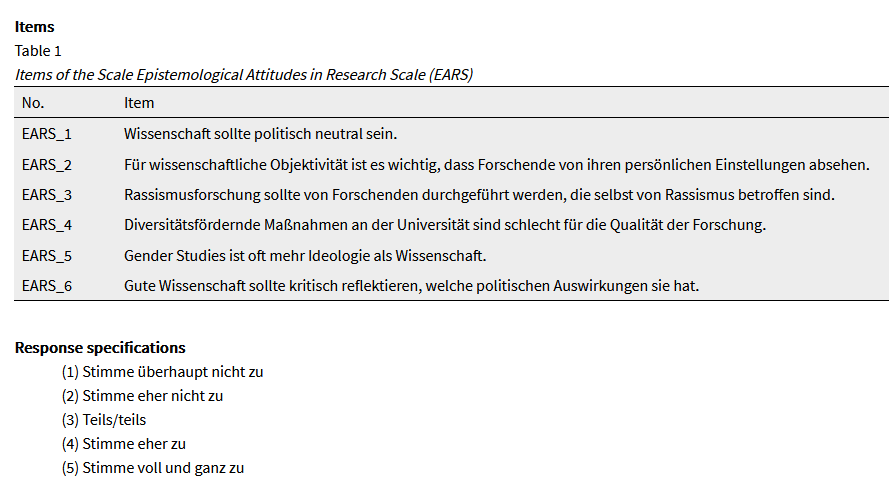EARS: Scale to measure epistemological attitudes

Mirjam Fischer and I developed EARS-6 (Epistemological attitudes in research scale). The scale is based on a set of items to measure whether the epistemological attitudes of students and academics are more positivist or critical.
Abstract
Epistemological questions – about how to achieve objective knowledge through research – have recently become a matter of political contestation, both from within and outside academia. Proponents of positivist epistemologies hold that objective knowledge can be produced by abstracting from one’s social position and accuse critical theories, such as gender studies, for moralizing and politicizing academia. Proponents of critical epistemologies hold that it is necessary to include socially situated knowledge into research. Therefore, they argue that a merely positivist epistemology stabilizes discrimination within academia and hinders broad knowledge by excluding minority standpoints. EARS-6 translates the epistemological and political debates to general attitudes towards research and the scale works independent of participants’ actual knowledge of epistemological theories.
Stay tuned
We developed the scale during an adversarial collaboration that aims to produce a politically nuanced quatitative study on alleged ‘cancel culture’ among German students. The main papers of this collaboration will be published this year.
Cite, download, read
Schubert, Karsten; Fischer, Mirjam (2023): Epistemological Attitudes in Research Scale (EARS-6). In: ZIS - The Collection of Items and Scales for the Social Sciences. https://doi.org/10.6102/ZIS336.
Related Posts
- New Publication: Defending Plurality. Four Reasons Why We Need to Rethink Academic Freedom in Europe, 19. April 2021
- New Journal Article: Two Concepts of Academic Freedom. The Relation Between Academia and Politics, 13. September 2023
- Online Evening Lecture: The Relationship between Academia and Politics in the Debate on Academic Freedom, 12. May 2022
- Teaching in the winter term: Struggles about academic freedom and freedom of expression (MA) and Identity Politics (BA, in English), 2. November 2021
- New post at Theorieblog: Toward a critical theory of academic freedom, 15. October 2021